Business Management Report: Tesco's Globalization in South Korea
VerifiedAdded on 2020/07/22
|12
|2980
|37
Report
AI Summary
This report analyzes Tesco's globalization strategy, focusing on its experiences in South Korea. The report begins by identifying the key drivers of globalization, including economic conditions, government regulations, social factors, competitive pressures, and technological advancements, and how these factors influenced Tesco's expansion into the South Korean market. It then compares Tesco's growth in South Korea with that of other global companies, highlighting its strategies for providing services and adopting new technologies. Finally, the report explores the reasons behind Tesco's decision to leave South Korea, including financial losses, cultural differences, and changes in the business environment. The conclusion summarizes the positive and negative impacts of globalization on Tesco's operations.
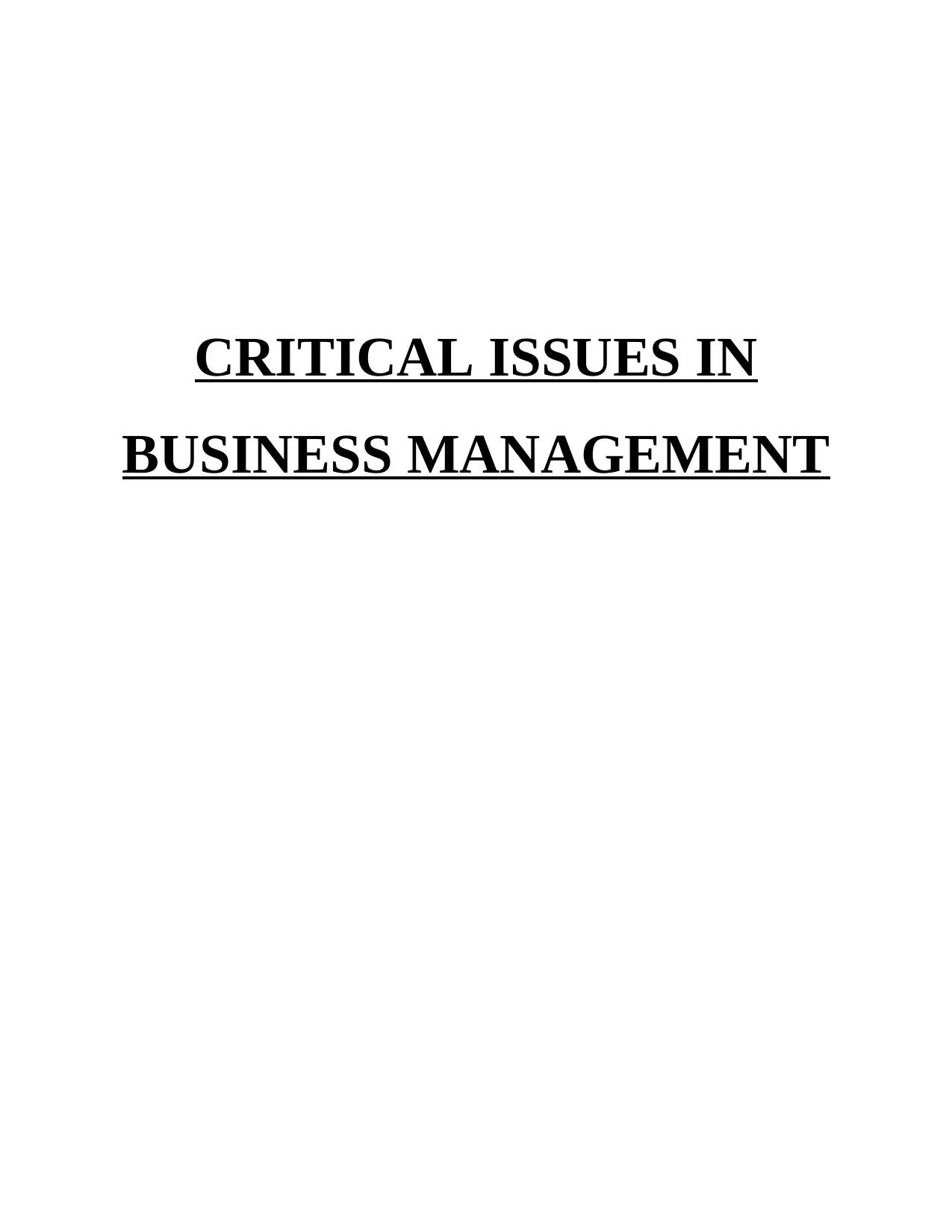
CRITICAL ISSUES IN
BUSINESS MANAGEMENT
BUSINESS MANAGEMENT
Paraphrase This Document
Need a fresh take? Get an instant paraphrase of this document with our AI Paraphraser
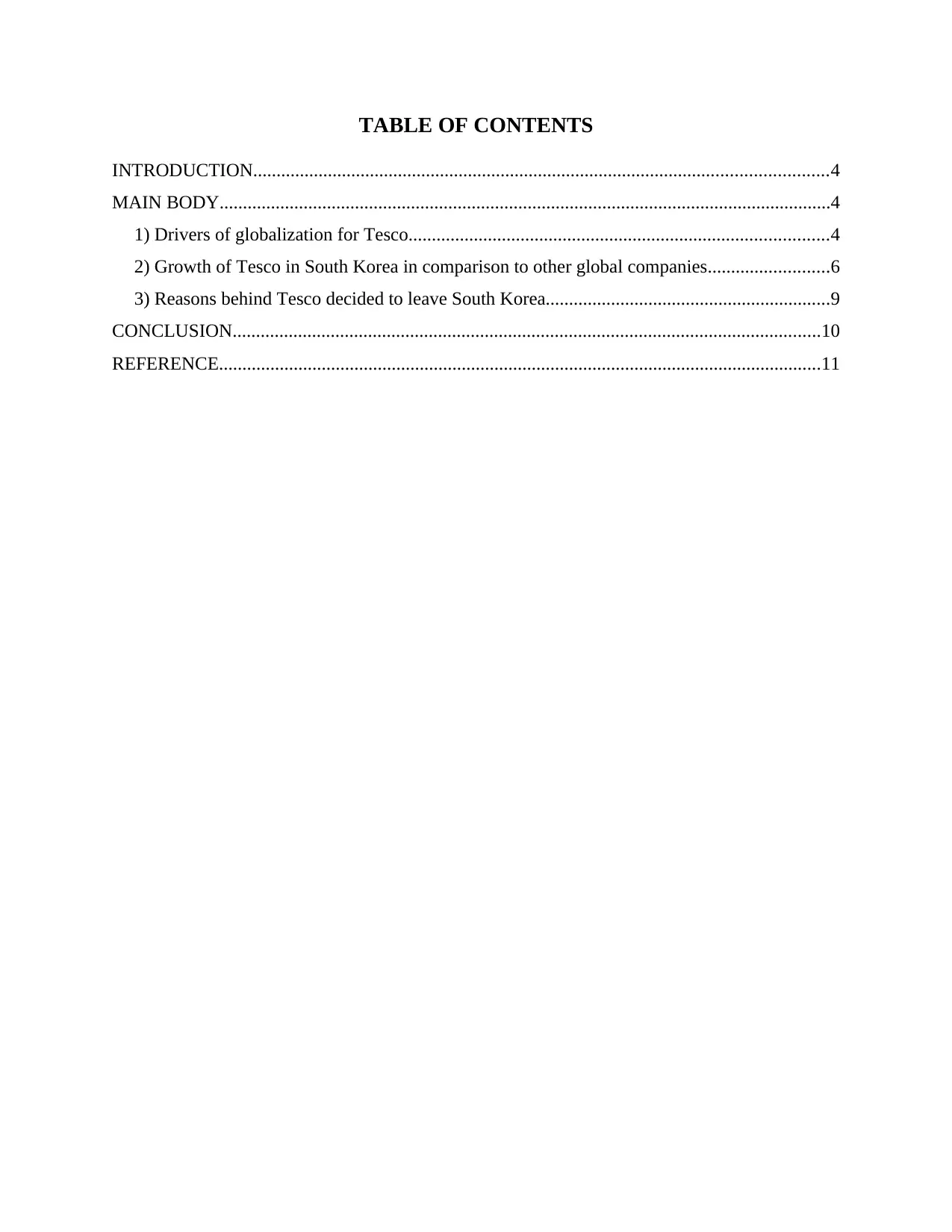
TABLE OF CONTENTS
INTRODUCTION...........................................................................................................................4
MAIN BODY...................................................................................................................................4
1) Drivers of globalization for Tesco..........................................................................................4
2) Growth of Tesco in South Korea in comparison to other global companies..........................6
3) Reasons behind Tesco decided to leave South Korea.............................................................9
CONCLUSION..............................................................................................................................10
REFERENCE.................................................................................................................................11
INTRODUCTION...........................................................................................................................4
MAIN BODY...................................................................................................................................4
1) Drivers of globalization for Tesco..........................................................................................4
2) Growth of Tesco in South Korea in comparison to other global companies..........................6
3) Reasons behind Tesco decided to leave South Korea.............................................................9
CONCLUSION..............................................................................................................................10
REFERENCE.................................................................................................................................11
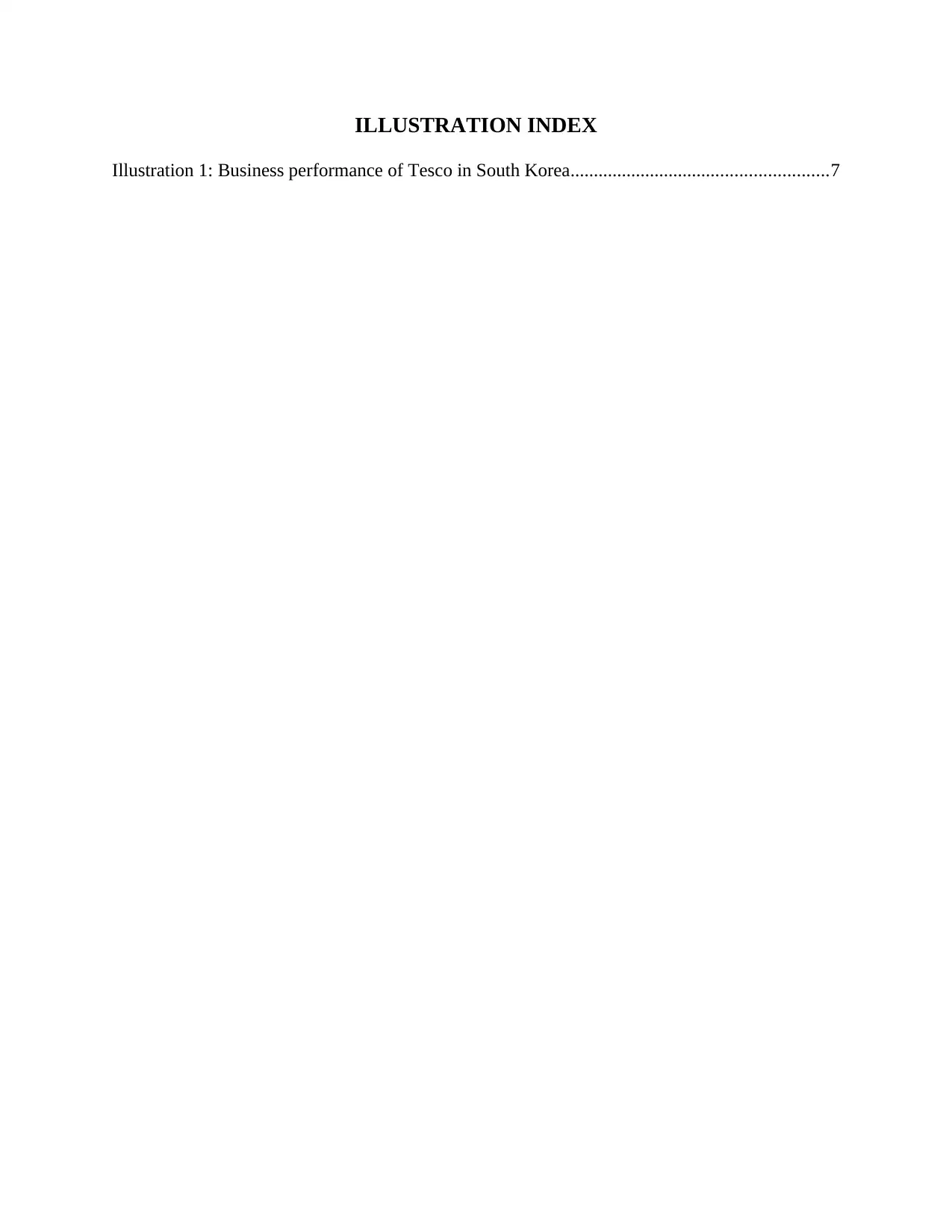
ILLUSTRATION INDEX
Illustration 1: Business performance of Tesco in South Korea.......................................................7
Illustration 1: Business performance of Tesco in South Korea.......................................................7
⊘ This is a preview!⊘
Do you want full access?
Subscribe today to unlock all pages.

Trusted by 1+ million students worldwide
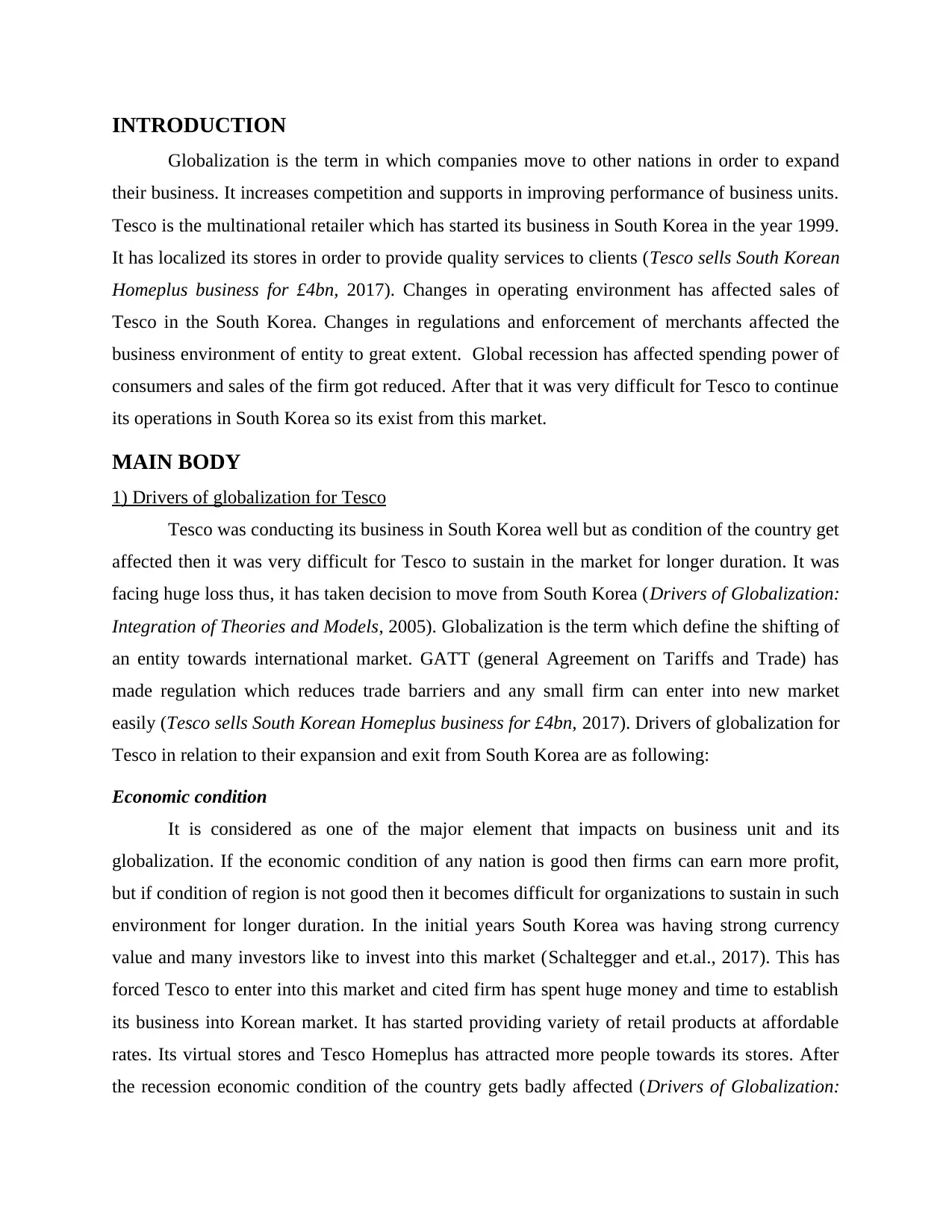
INTRODUCTION
Globalization is the term in which companies move to other nations in order to expand
their business. It increases competition and supports in improving performance of business units.
Tesco is the multinational retailer which has started its business in South Korea in the year 1999.
It has localized its stores in order to provide quality services to clients (Tesco sells South Korean
Homeplus business for £4bn, 2017). Changes in operating environment has affected sales of
Tesco in the South Korea. Changes in regulations and enforcement of merchants affected the
business environment of entity to great extent. Global recession has affected spending power of
consumers and sales of the firm got reduced. After that it was very difficult for Tesco to continue
its operations in South Korea so its exist from this market.
MAIN BODY
1) Drivers of globalization for Tesco
Tesco was conducting its business in South Korea well but as condition of the country get
affected then it was very difficult for Tesco to sustain in the market for longer duration. It was
facing huge loss thus, it has taken decision to move from South Korea (Drivers of Globalization:
Integration of Theories and Models, 2005). Globalization is the term which define the shifting of
an entity towards international market. GATT (general Agreement on Tariffs and Trade) has
made regulation which reduces trade barriers and any small firm can enter into new market
easily (Tesco sells South Korean Homeplus business for £4bn, 2017). Drivers of globalization for
Tesco in relation to their expansion and exit from South Korea are as following:
Economic condition
It is considered as one of the major element that impacts on business unit and its
globalization. If the economic condition of any nation is good then firms can earn more profit,
but if condition of region is not good then it becomes difficult for organizations to sustain in such
environment for longer duration. In the initial years South Korea was having strong currency
value and many investors like to invest into this market (Schaltegger and et.al., 2017). This has
forced Tesco to enter into this market and cited firm has spent huge money and time to establish
its business into Korean market. It has started providing variety of retail products at affordable
rates. Its virtual stores and Tesco Homeplus has attracted more people towards its stores. After
the recession economic condition of the country gets badly affected (Drivers of Globalization:
Globalization is the term in which companies move to other nations in order to expand
their business. It increases competition and supports in improving performance of business units.
Tesco is the multinational retailer which has started its business in South Korea in the year 1999.
It has localized its stores in order to provide quality services to clients (Tesco sells South Korean
Homeplus business for £4bn, 2017). Changes in operating environment has affected sales of
Tesco in the South Korea. Changes in regulations and enforcement of merchants affected the
business environment of entity to great extent. Global recession has affected spending power of
consumers and sales of the firm got reduced. After that it was very difficult for Tesco to continue
its operations in South Korea so its exist from this market.
MAIN BODY
1) Drivers of globalization for Tesco
Tesco was conducting its business in South Korea well but as condition of the country get
affected then it was very difficult for Tesco to sustain in the market for longer duration. It was
facing huge loss thus, it has taken decision to move from South Korea (Drivers of Globalization:
Integration of Theories and Models, 2005). Globalization is the term which define the shifting of
an entity towards international market. GATT (general Agreement on Tariffs and Trade) has
made regulation which reduces trade barriers and any small firm can enter into new market
easily (Tesco sells South Korean Homeplus business for £4bn, 2017). Drivers of globalization for
Tesco in relation to their expansion and exit from South Korea are as following:
Economic condition
It is considered as one of the major element that impacts on business unit and its
globalization. If the economic condition of any nation is good then firms can earn more profit,
but if condition of region is not good then it becomes difficult for organizations to sustain in such
environment for longer duration. In the initial years South Korea was having strong currency
value and many investors like to invest into this market (Schaltegger and et.al., 2017). This has
forced Tesco to enter into this market and cited firm has spent huge money and time to establish
its business into Korean market. It has started providing variety of retail products at affordable
rates. Its virtual stores and Tesco Homeplus has attracted more people towards its stores. After
the recession economic condition of the country gets badly affected (Drivers of Globalization:
Paraphrase This Document
Need a fresh take? Get an instant paraphrase of this document with our AI Paraphraser
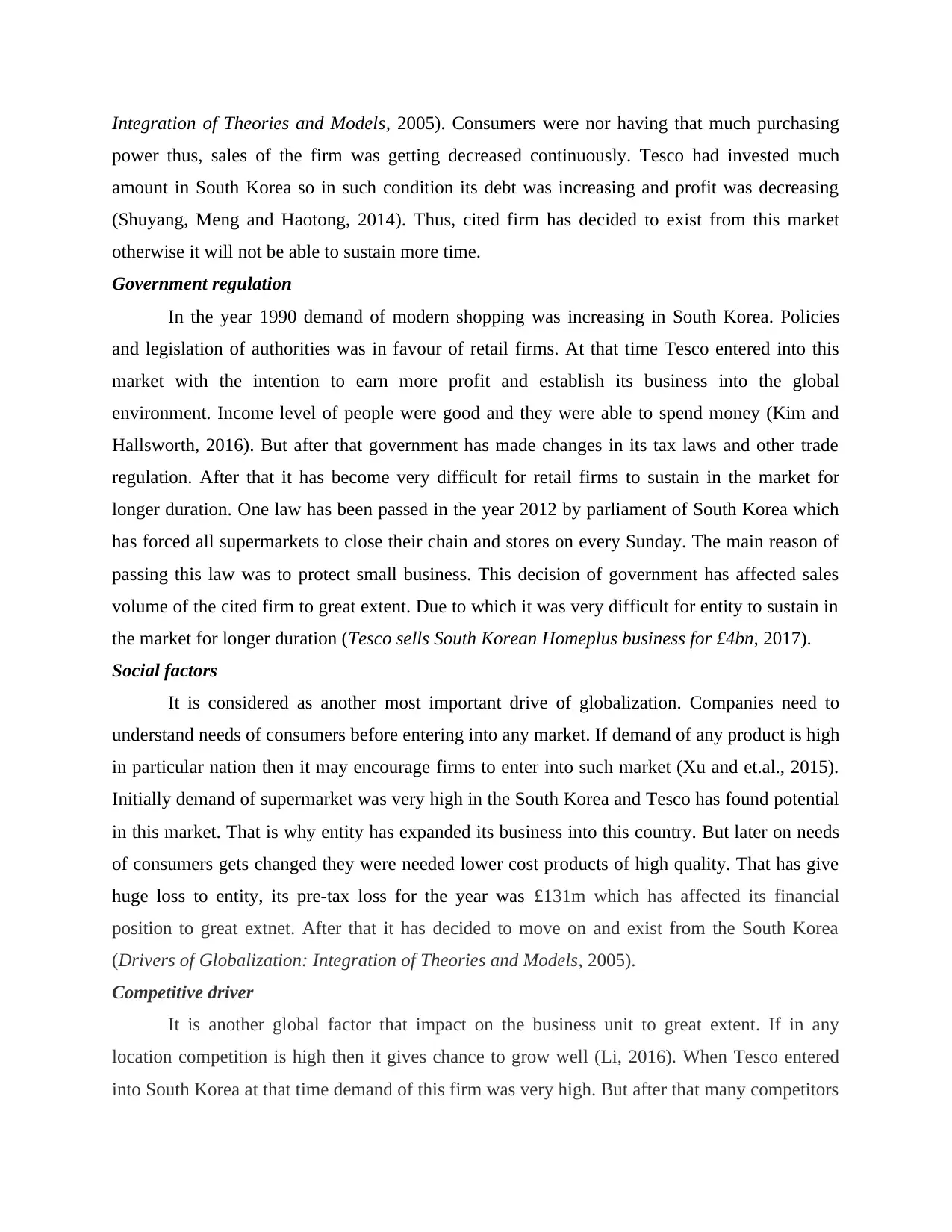
Integration of Theories and Models, 2005). Consumers were nor having that much purchasing
power thus, sales of the firm was getting decreased continuously. Tesco had invested much
amount in South Korea so in such condition its debt was increasing and profit was decreasing
(Shuyang, Meng and Haotong, 2014). Thus, cited firm has decided to exist from this market
otherwise it will not be able to sustain more time.
Government regulation
In the year 1990 demand of modern shopping was increasing in South Korea. Policies
and legislation of authorities was in favour of retail firms. At that time Tesco entered into this
market with the intention to earn more profit and establish its business into the global
environment. Income level of people were good and they were able to spend money (Kim and
Hallsworth, 2016). But after that government has made changes in its tax laws and other trade
regulation. After that it has become very difficult for retail firms to sustain in the market for
longer duration. One law has been passed in the year 2012 by parliament of South Korea which
has forced all supermarkets to close their chain and stores on every Sunday. The main reason of
passing this law was to protect small business. This decision of government has affected sales
volume of the cited firm to great extent. Due to which it was very difficult for entity to sustain in
the market for longer duration (Tesco sells South Korean Homeplus business for £4bn, 2017).
Social factors
It is considered as another most important drive of globalization. Companies need to
understand needs of consumers before entering into any market. If demand of any product is high
in particular nation then it may encourage firms to enter into such market (Xu and et.al., 2015).
Initially demand of supermarket was very high in the South Korea and Tesco has found potential
in this market. That is why entity has expanded its business into this country. But later on needs
of consumers gets changed they were needed lower cost products of high quality. That has give
huge loss to entity, its pre-tax loss for the year was £131m which has affected its financial
position to great extnet. After that it has decided to move on and exist from the South Korea
(Drivers of Globalization: Integration of Theories and Models, 2005).
Competitive driver
It is another global factor that impact on the business unit to great extent. If in any
location competition is high then it gives chance to grow well (Li, 2016). When Tesco entered
into South Korea at that time demand of this firm was very high. But after that many competitors
power thus, sales of the firm was getting decreased continuously. Tesco had invested much
amount in South Korea so in such condition its debt was increasing and profit was decreasing
(Shuyang, Meng and Haotong, 2014). Thus, cited firm has decided to exist from this market
otherwise it will not be able to sustain more time.
Government regulation
In the year 1990 demand of modern shopping was increasing in South Korea. Policies
and legislation of authorities was in favour of retail firms. At that time Tesco entered into this
market with the intention to earn more profit and establish its business into the global
environment. Income level of people were good and they were able to spend money (Kim and
Hallsworth, 2016). But after that government has made changes in its tax laws and other trade
regulation. After that it has become very difficult for retail firms to sustain in the market for
longer duration. One law has been passed in the year 2012 by parliament of South Korea which
has forced all supermarkets to close their chain and stores on every Sunday. The main reason of
passing this law was to protect small business. This decision of government has affected sales
volume of the cited firm to great extent. Due to which it was very difficult for entity to sustain in
the market for longer duration (Tesco sells South Korean Homeplus business for £4bn, 2017).
Social factors
It is considered as another most important drive of globalization. Companies need to
understand needs of consumers before entering into any market. If demand of any product is high
in particular nation then it may encourage firms to enter into such market (Xu and et.al., 2015).
Initially demand of supermarket was very high in the South Korea and Tesco has found potential
in this market. That is why entity has expanded its business into this country. But later on needs
of consumers gets changed they were needed lower cost products of high quality. That has give
huge loss to entity, its pre-tax loss for the year was £131m which has affected its financial
position to great extnet. After that it has decided to move on and exist from the South Korea
(Drivers of Globalization: Integration of Theories and Models, 2005).
Competitive driver
It is another global factor that impact on the business unit to great extent. If in any
location competition is high then it gives chance to grow well (Li, 2016). When Tesco entered
into South Korea at that time demand of this firm was very high. But after that many competitors
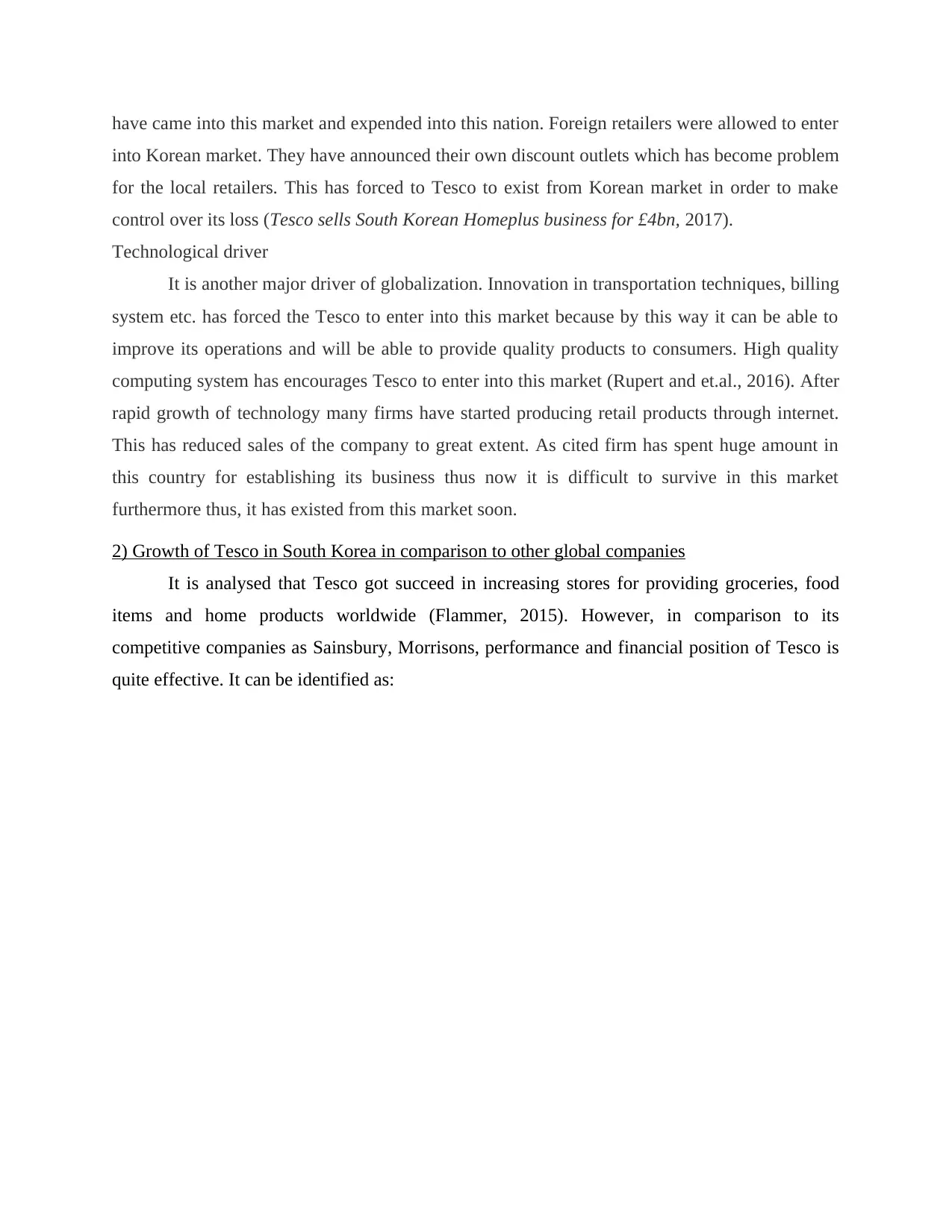
have came into this market and expended into this nation. Foreign retailers were allowed to enter
into Korean market. They have announced their own discount outlets which has become problem
for the local retailers. This has forced to Tesco to exist from Korean market in order to make
control over its loss (Tesco sells South Korean Homeplus business for £4bn, 2017).
Technological driver
It is another major driver of globalization. Innovation in transportation techniques, billing
system etc. has forced the Tesco to enter into this market because by this way it can be able to
improve its operations and will be able to provide quality products to consumers. High quality
computing system has encourages Tesco to enter into this market (Rupert and et.al., 2016). After
rapid growth of technology many firms have started producing retail products through internet.
This has reduced sales of the company to great extent. As cited firm has spent huge amount in
this country for establishing its business thus now it is difficult to survive in this market
furthermore thus, it has existed from this market soon.
2) Growth of Tesco in South Korea in comparison to other global companies
It is analysed that Tesco got succeed in increasing stores for providing groceries, food
items and home products worldwide (Flammer, 2015). However, in comparison to its
competitive companies as Sainsbury, Morrisons, performance and financial position of Tesco is
quite effective. It can be identified as:
into Korean market. They have announced their own discount outlets which has become problem
for the local retailers. This has forced to Tesco to exist from Korean market in order to make
control over its loss (Tesco sells South Korean Homeplus business for £4bn, 2017).
Technological driver
It is another major driver of globalization. Innovation in transportation techniques, billing
system etc. has forced the Tesco to enter into this market because by this way it can be able to
improve its operations and will be able to provide quality products to consumers. High quality
computing system has encourages Tesco to enter into this market (Rupert and et.al., 2016). After
rapid growth of technology many firms have started producing retail products through internet.
This has reduced sales of the company to great extent. As cited firm has spent huge amount in
this country for establishing its business thus now it is difficult to survive in this market
furthermore thus, it has existed from this market soon.
2) Growth of Tesco in South Korea in comparison to other global companies
It is analysed that Tesco got succeed in increasing stores for providing groceries, food
items and home products worldwide (Flammer, 2015). However, in comparison to its
competitive companies as Sainsbury, Morrisons, performance and financial position of Tesco is
quite effective. It can be identified as:
⊘ This is a preview!⊘
Do you want full access?
Subscribe today to unlock all pages.

Trusted by 1+ million students worldwide
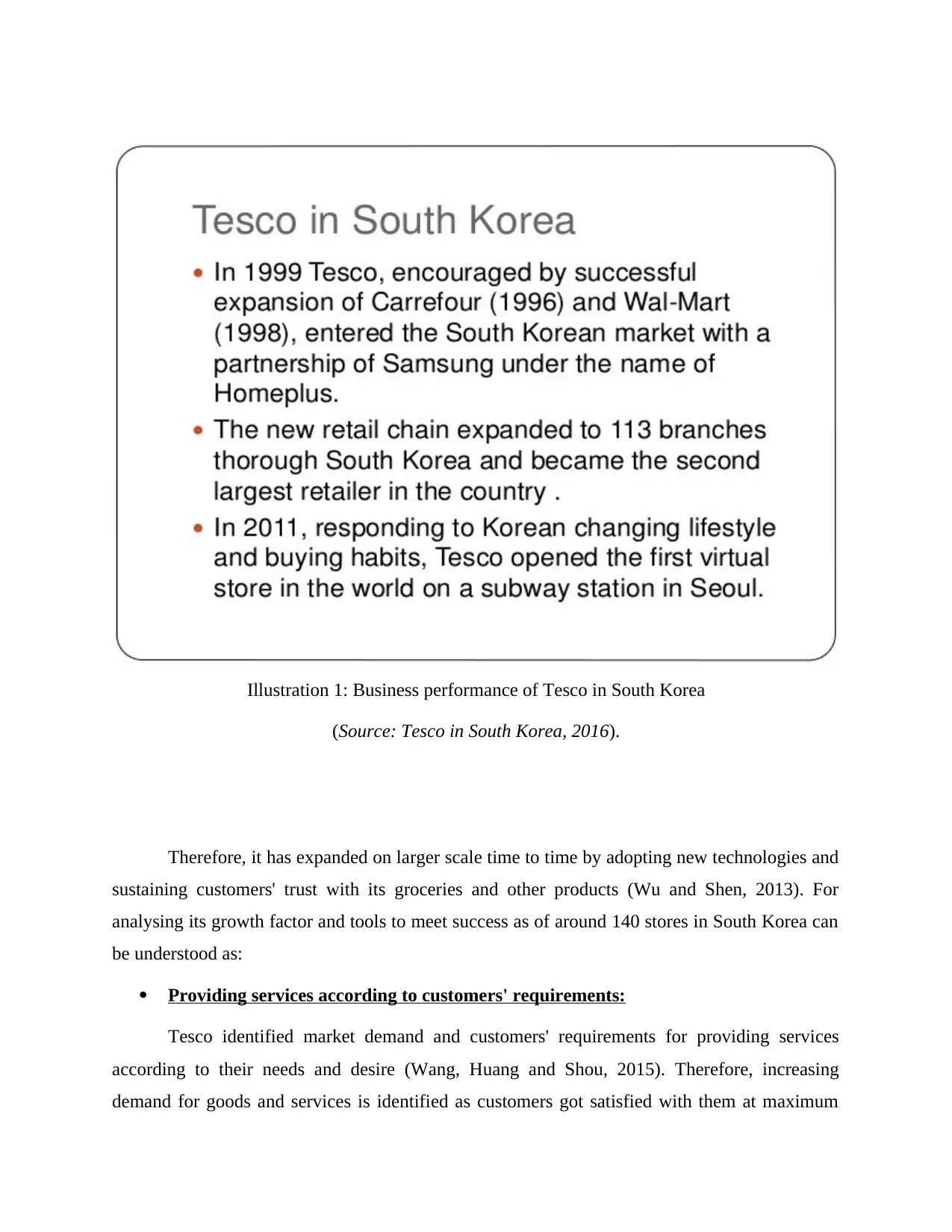
Therefore, it has expanded on larger scale time to time by adopting new technologies and
sustaining customers' trust with its groceries and other products (Wu and Shen, 2013). For
analysing its growth factor and tools to meet success as of around 140 stores in South Korea can
be understood as:
Providing services according to customers' requirements:
Tesco identified market demand and customers' requirements for providing services
according to their needs and desire (Wang, Huang and Shou, 2015). Therefore, increasing
demand for goods and services is identified as customers got satisfied with them at maximum
Illustration 1: Business performance of Tesco in South Korea
(Source: Tesco in South Korea, 2016).
sustaining customers' trust with its groceries and other products (Wu and Shen, 2013). For
analysing its growth factor and tools to meet success as of around 140 stores in South Korea can
be understood as:
Providing services according to customers' requirements:
Tesco identified market demand and customers' requirements for providing services
according to their needs and desire (Wang, Huang and Shou, 2015). Therefore, increasing
demand for goods and services is identified as customers got satisfied with them at maximum
Illustration 1: Business performance of Tesco in South Korea
(Source: Tesco in South Korea, 2016).
Paraphrase This Document
Need a fresh take? Get an instant paraphrase of this document with our AI Paraphraser
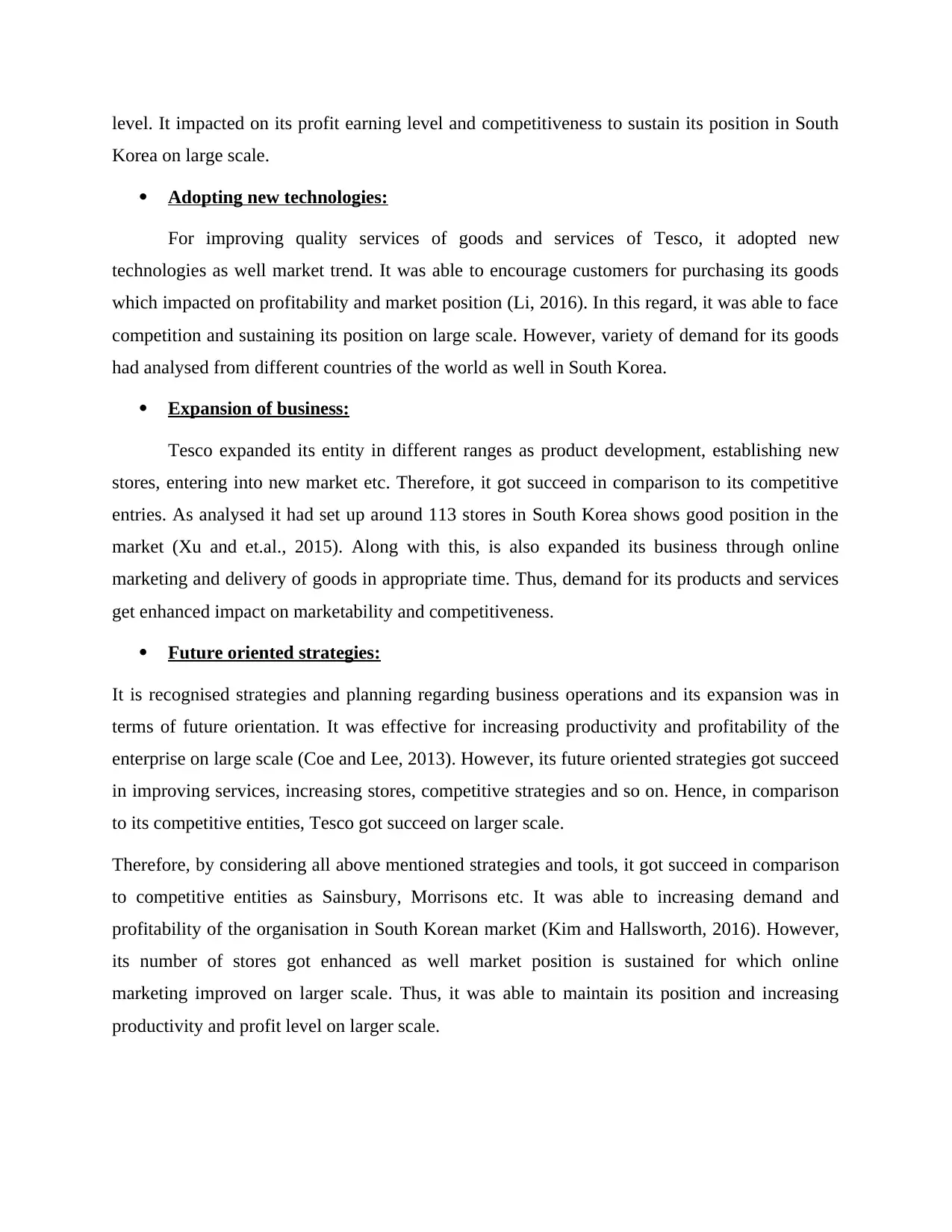
level. It impacted on its profit earning level and competitiveness to sustain its position in South
Korea on large scale.
Adopting new technologies:
For improving quality services of goods and services of Tesco, it adopted new
technologies as well market trend. It was able to encourage customers for purchasing its goods
which impacted on profitability and market position (Li, 2016). In this regard, it was able to face
competition and sustaining its position on large scale. However, variety of demand for its goods
had analysed from different countries of the world as well in South Korea.
Expansion of business:
Tesco expanded its entity in different ranges as product development, establishing new
stores, entering into new market etc. Therefore, it got succeed in comparison to its competitive
entries. As analysed it had set up around 113 stores in South Korea shows good position in the
market (Xu and et.al., 2015). Along with this, is also expanded its business through online
marketing and delivery of goods in appropriate time. Thus, demand for its products and services
get enhanced impact on marketability and competitiveness.
Future oriented strategies:
It is recognised strategies and planning regarding business operations and its expansion was in
terms of future orientation. It was effective for increasing productivity and profitability of the
enterprise on large scale (Coe and Lee, 2013). However, its future oriented strategies got succeed
in improving services, increasing stores, competitive strategies and so on. Hence, in comparison
to its competitive entities, Tesco got succeed on larger scale.
Therefore, by considering all above mentioned strategies and tools, it got succeed in comparison
to competitive entities as Sainsbury, Morrisons etc. It was able to increasing demand and
profitability of the organisation in South Korean market (Kim and Hallsworth, 2016). However,
its number of stores got enhanced as well market position is sustained for which online
marketing improved on larger scale. Thus, it was able to maintain its position and increasing
productivity and profit level on larger scale.
Korea on large scale.
Adopting new technologies:
For improving quality services of goods and services of Tesco, it adopted new
technologies as well market trend. It was able to encourage customers for purchasing its goods
which impacted on profitability and market position (Li, 2016). In this regard, it was able to face
competition and sustaining its position on large scale. However, variety of demand for its goods
had analysed from different countries of the world as well in South Korea.
Expansion of business:
Tesco expanded its entity in different ranges as product development, establishing new
stores, entering into new market etc. Therefore, it got succeed in comparison to its competitive
entries. As analysed it had set up around 113 stores in South Korea shows good position in the
market (Xu and et.al., 2015). Along with this, is also expanded its business through online
marketing and delivery of goods in appropriate time. Thus, demand for its products and services
get enhanced impact on marketability and competitiveness.
Future oriented strategies:
It is recognised strategies and planning regarding business operations and its expansion was in
terms of future orientation. It was effective for increasing productivity and profitability of the
enterprise on large scale (Coe and Lee, 2013). However, its future oriented strategies got succeed
in improving services, increasing stores, competitive strategies and so on. Hence, in comparison
to its competitive entities, Tesco got succeed on larger scale.
Therefore, by considering all above mentioned strategies and tools, it got succeed in comparison
to competitive entities as Sainsbury, Morrisons etc. It was able to increasing demand and
profitability of the organisation in South Korean market (Kim and Hallsworth, 2016). However,
its number of stores got enhanced as well market position is sustained for which online
marketing improved on larger scale. Thus, it was able to maintain its position and increasing
productivity and profit level on larger scale.
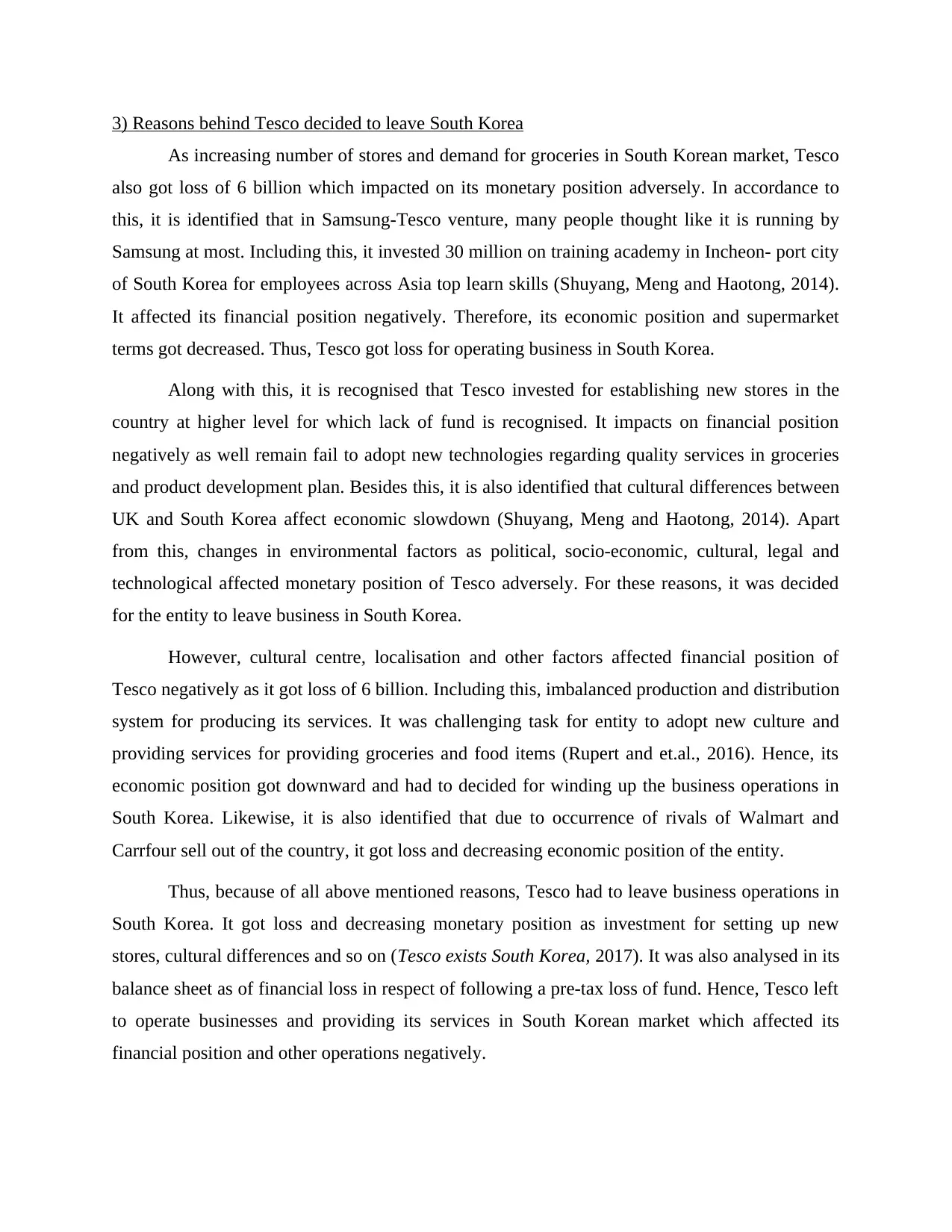
3) Reasons behind Tesco decided to leave South Korea
As increasing number of stores and demand for groceries in South Korean market, Tesco
also got loss of 6 billion which impacted on its monetary position adversely. In accordance to
this, it is identified that in Samsung-Tesco venture, many people thought like it is running by
Samsung at most. Including this, it invested 30 million on training academy in Incheon- port city
of South Korea for employees across Asia top learn skills (Shuyang, Meng and Haotong, 2014).
It affected its financial position negatively. Therefore, its economic position and supermarket
terms got decreased. Thus, Tesco got loss for operating business in South Korea.
Along with this, it is recognised that Tesco invested for establishing new stores in the
country at higher level for which lack of fund is recognised. It impacts on financial position
negatively as well remain fail to adopt new technologies regarding quality services in groceries
and product development plan. Besides this, it is also identified that cultural differences between
UK and South Korea affect economic slowdown (Shuyang, Meng and Haotong, 2014). Apart
from this, changes in environmental factors as political, socio-economic, cultural, legal and
technological affected monetary position of Tesco adversely. For these reasons, it was decided
for the entity to leave business in South Korea.
However, cultural centre, localisation and other factors affected financial position of
Tesco negatively as it got loss of 6 billion. Including this, imbalanced production and distribution
system for producing its services. It was challenging task for entity to adopt new culture and
providing services for providing groceries and food items (Rupert and et.al., 2016). Hence, its
economic position got downward and had to decided for winding up the business operations in
South Korea. Likewise, it is also identified that due to occurrence of rivals of Walmart and
Carrfour sell out of the country, it got loss and decreasing economic position of the entity.
Thus, because of all above mentioned reasons, Tesco had to leave business operations in
South Korea. It got loss and decreasing monetary position as investment for setting up new
stores, cultural differences and so on (Tesco exists South Korea, 2017). It was also analysed in its
balance sheet as of financial loss in respect of following a pre-tax loss of fund. Hence, Tesco left
to operate businesses and providing its services in South Korean market which affected its
financial position and other operations negatively.
As increasing number of stores and demand for groceries in South Korean market, Tesco
also got loss of 6 billion which impacted on its monetary position adversely. In accordance to
this, it is identified that in Samsung-Tesco venture, many people thought like it is running by
Samsung at most. Including this, it invested 30 million on training academy in Incheon- port city
of South Korea for employees across Asia top learn skills (Shuyang, Meng and Haotong, 2014).
It affected its financial position negatively. Therefore, its economic position and supermarket
terms got decreased. Thus, Tesco got loss for operating business in South Korea.
Along with this, it is recognised that Tesco invested for establishing new stores in the
country at higher level for which lack of fund is recognised. It impacts on financial position
negatively as well remain fail to adopt new technologies regarding quality services in groceries
and product development plan. Besides this, it is also identified that cultural differences between
UK and South Korea affect economic slowdown (Shuyang, Meng and Haotong, 2014). Apart
from this, changes in environmental factors as political, socio-economic, cultural, legal and
technological affected monetary position of Tesco adversely. For these reasons, it was decided
for the entity to leave business in South Korea.
However, cultural centre, localisation and other factors affected financial position of
Tesco negatively as it got loss of 6 billion. Including this, imbalanced production and distribution
system for producing its services. It was challenging task for entity to adopt new culture and
providing services for providing groceries and food items (Rupert and et.al., 2016). Hence, its
economic position got downward and had to decided for winding up the business operations in
South Korea. Likewise, it is also identified that due to occurrence of rivals of Walmart and
Carrfour sell out of the country, it got loss and decreasing economic position of the entity.
Thus, because of all above mentioned reasons, Tesco had to leave business operations in
South Korea. It got loss and decreasing monetary position as investment for setting up new
stores, cultural differences and so on (Tesco exists South Korea, 2017). It was also analysed in its
balance sheet as of financial loss in respect of following a pre-tax loss of fund. Hence, Tesco left
to operate businesses and providing its services in South Korean market which affected its
financial position and other operations negatively.
⊘ This is a preview!⊘
Do you want full access?
Subscribe today to unlock all pages.

Trusted by 1+ million students worldwide
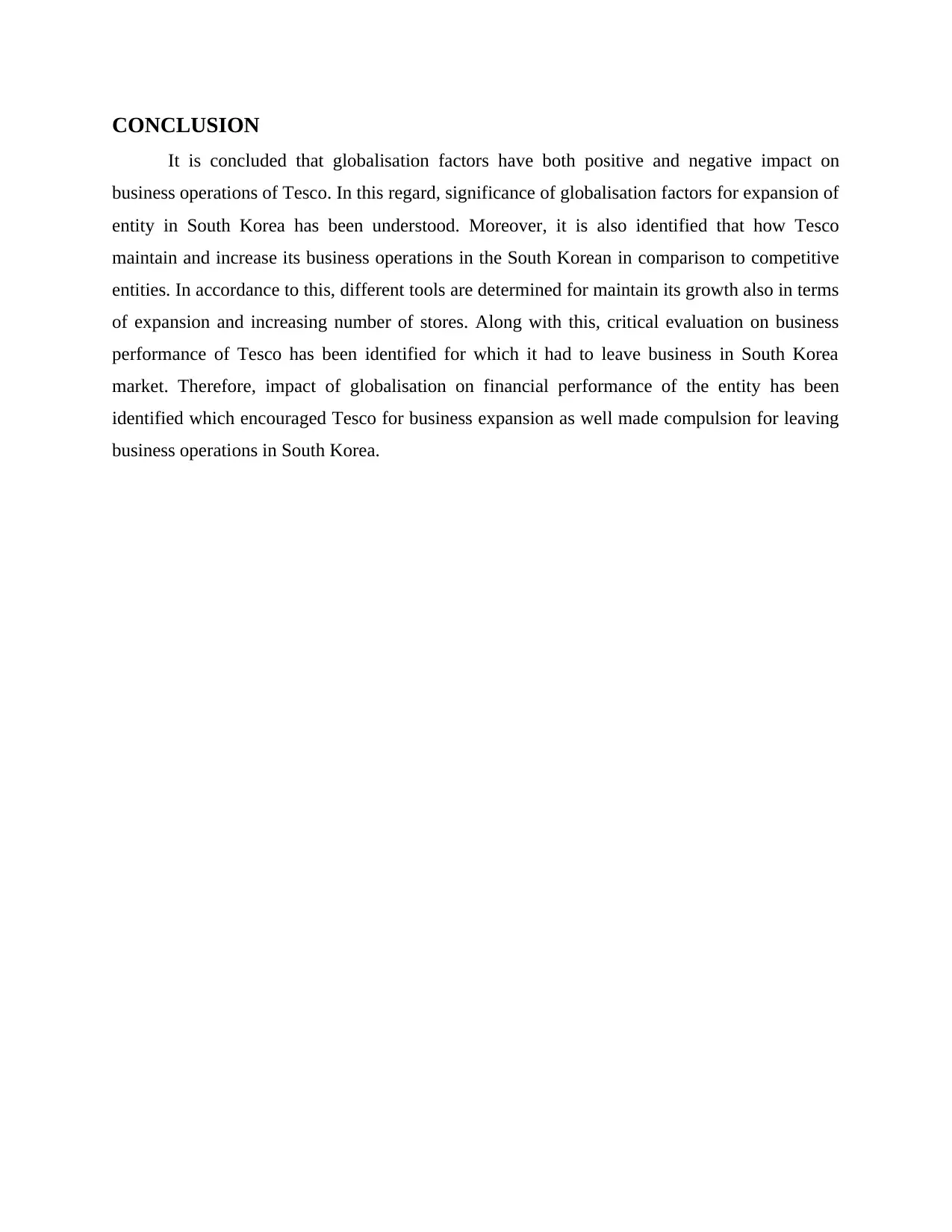
CONCLUSION
It is concluded that globalisation factors have both positive and negative impact on
business operations of Tesco. In this regard, significance of globalisation factors for expansion of
entity in South Korea has been understood. Moreover, it is also identified that how Tesco
maintain and increase its business operations in the South Korean in comparison to competitive
entities. In accordance to this, different tools are determined for maintain its growth also in terms
of expansion and increasing number of stores. Along with this, critical evaluation on business
performance of Tesco has been identified for which it had to leave business in South Korea
market. Therefore, impact of globalisation on financial performance of the entity has been
identified which encouraged Tesco for business expansion as well made compulsion for leaving
business operations in South Korea.
It is concluded that globalisation factors have both positive and negative impact on
business operations of Tesco. In this regard, significance of globalisation factors for expansion of
entity in South Korea has been understood. Moreover, it is also identified that how Tesco
maintain and increase its business operations in the South Korean in comparison to competitive
entities. In accordance to this, different tools are determined for maintain its growth also in terms
of expansion and increasing number of stores. Along with this, critical evaluation on business
performance of Tesco has been identified for which it had to leave business in South Korea
market. Therefore, impact of globalisation on financial performance of the entity has been
identified which encouraged Tesco for business expansion as well made compulsion for leaving
business operations in South Korea.
Paraphrase This Document
Need a fresh take? Get an instant paraphrase of this document with our AI Paraphraser
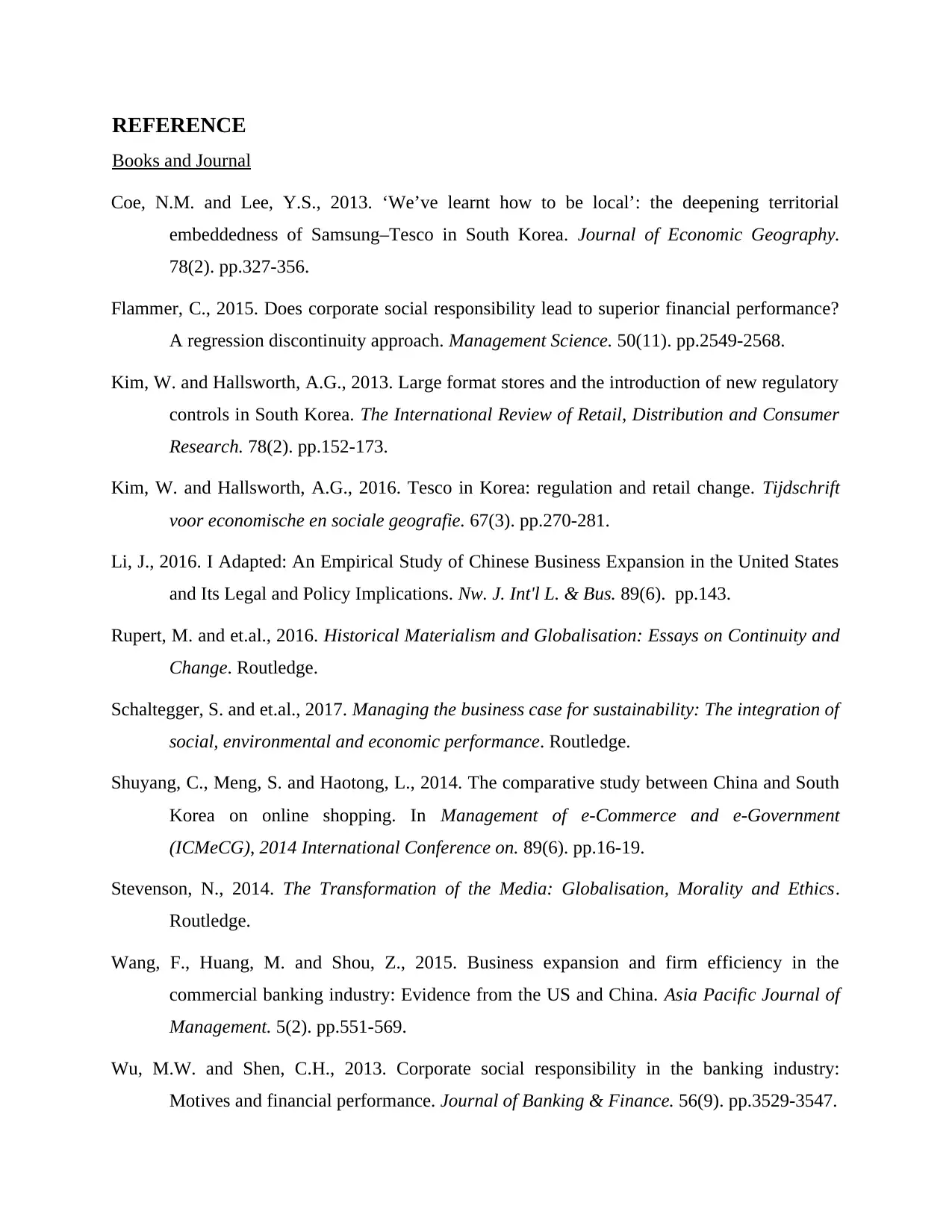
REFERENCE
Books and Journal
Coe, N.M. and Lee, Y.S., 2013. ‘We’ve learnt how to be local’: the deepening territorial
embeddedness of Samsung–Tesco in South Korea. Journal of Economic Geography.
78(2). pp.327-356.
Flammer, C., 2015. Does corporate social responsibility lead to superior financial performance?
A regression discontinuity approach. Management Science. 50(11). pp.2549-2568.
Kim, W. and Hallsworth, A.G., 2013. Large format stores and the introduction of new regulatory
controls in South Korea. The International Review of Retail, Distribution and Consumer
Research. 78(2). pp.152-173.
Kim, W. and Hallsworth, A.G., 2016. Tesco in Korea: regulation and retail change. Tijdschrift
voor economische en sociale geografie. 67(3). pp.270-281.
Li, J., 2016. I Adapted: An Empirical Study of Chinese Business Expansion in the United States
and Its Legal and Policy Implications. Nw. J. Int'l L. & Bus. 89(6). pp.143.
Rupert, M. and et.al., 2016. Historical Materialism and Globalisation: Essays on Continuity and
Change. Routledge.
Schaltegger, S. and et.al., 2017. Managing the business case for sustainability: The integration of
social, environmental and economic performance. Routledge.
Shuyang, C., Meng, S. and Haotong, L., 2014. The comparative study between China and South
Korea on online shopping. In Management of e-Commerce and e-Government
(ICMeCG), 2014 International Conference on. 89(6). pp.16-19.
Stevenson, N., 2014. The Transformation of the Media: Globalisation, Morality and Ethics.
Routledge.
Wang, F., Huang, M. and Shou, Z., 2015. Business expansion and firm efficiency in the
commercial banking industry: Evidence from the US and China. Asia Pacific Journal of
Management. 5(2). pp.551-569.
Wu, M.W. and Shen, C.H., 2013. Corporate social responsibility in the banking industry:
Motives and financial performance. Journal of Banking & Finance. 56(9). pp.3529-3547.
Books and Journal
Coe, N.M. and Lee, Y.S., 2013. ‘We’ve learnt how to be local’: the deepening territorial
embeddedness of Samsung–Tesco in South Korea. Journal of Economic Geography.
78(2). pp.327-356.
Flammer, C., 2015. Does corporate social responsibility lead to superior financial performance?
A regression discontinuity approach. Management Science. 50(11). pp.2549-2568.
Kim, W. and Hallsworth, A.G., 2013. Large format stores and the introduction of new regulatory
controls in South Korea. The International Review of Retail, Distribution and Consumer
Research. 78(2). pp.152-173.
Kim, W. and Hallsworth, A.G., 2016. Tesco in Korea: regulation and retail change. Tijdschrift
voor economische en sociale geografie. 67(3). pp.270-281.
Li, J., 2016. I Adapted: An Empirical Study of Chinese Business Expansion in the United States
and Its Legal and Policy Implications. Nw. J. Int'l L. & Bus. 89(6). pp.143.
Rupert, M. and et.al., 2016. Historical Materialism and Globalisation: Essays on Continuity and
Change. Routledge.
Schaltegger, S. and et.al., 2017. Managing the business case for sustainability: The integration of
social, environmental and economic performance. Routledge.
Shuyang, C., Meng, S. and Haotong, L., 2014. The comparative study between China and South
Korea on online shopping. In Management of e-Commerce and e-Government
(ICMeCG), 2014 International Conference on. 89(6). pp.16-19.
Stevenson, N., 2014. The Transformation of the Media: Globalisation, Morality and Ethics.
Routledge.
Wang, F., Huang, M. and Shou, Z., 2015. Business expansion and firm efficiency in the
commercial banking industry: Evidence from the US and China. Asia Pacific Journal of
Management. 5(2). pp.551-569.
Wu, M.W. and Shen, C.H., 2013. Corporate social responsibility in the banking industry:
Motives and financial performance. Journal of Banking & Finance. 56(9). pp.3529-3547.
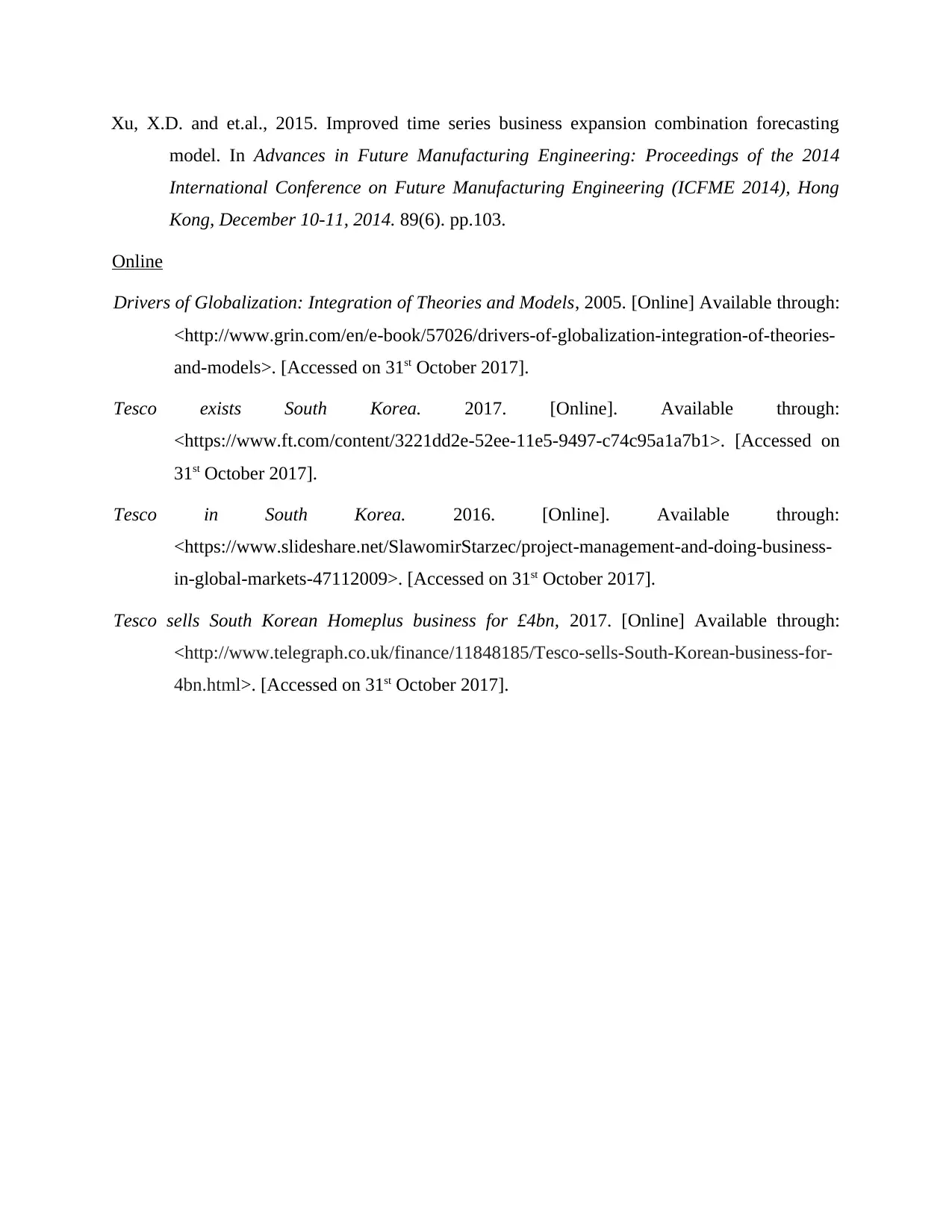
Xu, X.D. and et.al., 2015. Improved time series business expansion combination forecasting
model. In Advances in Future Manufacturing Engineering: Proceedings of the 2014
International Conference on Future Manufacturing Engineering (ICFME 2014), Hong
Kong, December 10-11, 2014. 89(6). pp.103.
Online
Drivers of Globalization: Integration of Theories and Models, 2005. [Online] Available through:
<http://www.grin.com/en/e-book/57026/drivers-of-globalization-integration-of-theories-
and-models>. [Accessed on 31st October 2017].
Tesco exists South Korea. 2017. [Online]. Available through:
<https://www.ft.com/content/3221dd2e-52ee-11e5-9497-c74c95a1a7b1>. [Accessed on
31st October 2017].
Tesco in South Korea. 2016. [Online]. Available through:
<https://www.slideshare.net/SlawomirStarzec/project-management-and-doing-business-
in-global-markets-47112009>. [Accessed on 31st October 2017].
Tesco sells South Korean Homeplus business for £4bn, 2017. [Online] Available through:
<http://www.telegraph.co.uk/finance/11848185/Tesco-sells-South-Korean-business-for-
4bn.html>. [Accessed on 31st October 2017].
model. In Advances in Future Manufacturing Engineering: Proceedings of the 2014
International Conference on Future Manufacturing Engineering (ICFME 2014), Hong
Kong, December 10-11, 2014. 89(6). pp.103.
Online
Drivers of Globalization: Integration of Theories and Models, 2005. [Online] Available through:
<http://www.grin.com/en/e-book/57026/drivers-of-globalization-integration-of-theories-
and-models>. [Accessed on 31st October 2017].
Tesco exists South Korea. 2017. [Online]. Available through:
<https://www.ft.com/content/3221dd2e-52ee-11e5-9497-c74c95a1a7b1>. [Accessed on
31st October 2017].
Tesco in South Korea. 2016. [Online]. Available through:
<https://www.slideshare.net/SlawomirStarzec/project-management-and-doing-business-
in-global-markets-47112009>. [Accessed on 31st October 2017].
Tesco sells South Korean Homeplus business for £4bn, 2017. [Online] Available through:
<http://www.telegraph.co.uk/finance/11848185/Tesco-sells-South-Korean-business-for-
4bn.html>. [Accessed on 31st October 2017].
⊘ This is a preview!⊘
Do you want full access?
Subscribe today to unlock all pages.

Trusted by 1+ million students worldwide
1 out of 12
Related Documents
Your All-in-One AI-Powered Toolkit for Academic Success.
+13062052269
info@desklib.com
Available 24*7 on WhatsApp / Email
![[object Object]](/_next/static/media/star-bottom.7253800d.svg)
Unlock your academic potential
Copyright © 2020–2026 A2Z Services. All Rights Reserved. Developed and managed by ZUCOL.





